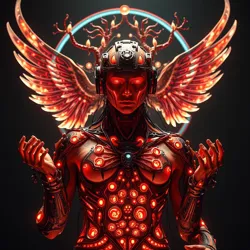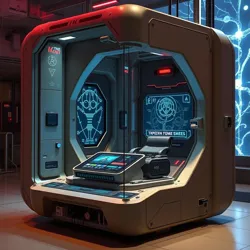Mythpunk Movement
The Mythpunk Movement emerged in the late 2150s as a radical reimagining of traditional mythological narratives through the lens of advanced technology and social revolution. Distinguished from other speculative genres by its focus on subverting ancient myths using biotechnological elements and neural storytelling, Mythpunk represents a significant evolution in narrative arts.
 A mythpunk artist performing "Prometheus Rewired" using synaptic storytelling technology
A mythpunk artist performing "Prometheus Rewired" using synaptic storytelling technologyOrigins
The movement began in the underground art scenes of Neo-Athens, where performers first combined classical mythology with bioelectric enhancement technology. Aria Stormweaver, credited with founding the movement, created the first mythpunk performance by retelling the Orpheus myth using neural resonance chambers.
Characteristics
Mythpunk works typically feature:
-
Radical reinterpretation of traditional mythological figures
-
Integration of biomechanical elements into ancient stories
-
Use of collective consciousness interfaces for audience participation
-
Deconstruction of traditional power structures in mythology
Notable Works
Performance Pieces
- "The Digital Odyssey" - A neural network retelling of Homer's classic
- "Valkyries in Void" - Nordic myths reimagined through cybernetic runes
- "Gods of the New Machine" - An interactive exploration of mechanical deities
 The revolutionary Story Synthesis Chamber used in major mythpunk productions
The revolutionary Story Synthesis Chamber used in major mythpunk productionsTechnical Elements
The movement relies heavily on specialized technology:
-
Narrative Enhancement Crystals
-
Mythic Pattern Generators
-
Neural Myth Interfaces
Cultural Impact
Mythpunk has dramatically influenced modern storytelling, leading to the establishment of the Digital Mythology Institute and numerous underground performance venues. The movement has sparked intense debate about the relationship between traditional narratives and technological progress.
See Also
- Techno-Shamanism
- Narrative Engineering
- Silicon Griots
References
- Digital Myths and Modern Legends
- The Evolution of Storytelling Technology
- Neural Narrative Applications